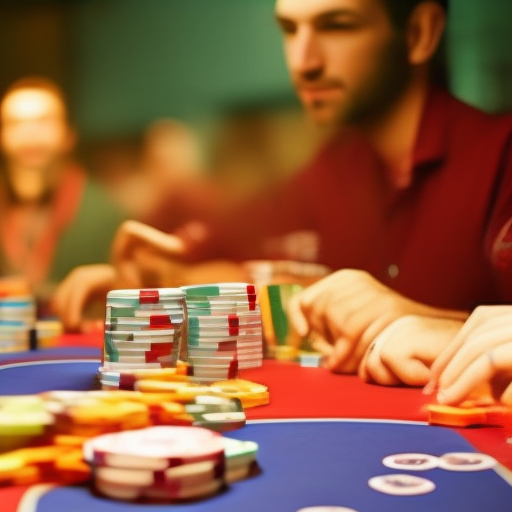The world of poker tournaments is far more than just a test of skill. It pushes players to the brink of their mental and emotional capacities, testing their mettle in a vise of pressure, uncertainty, and luck. It’s a complex and exciting environment, which is why it’s so important to master the mental game of poker.
The Psychology of Poker
Poker is not just a game of cards, it is a game of psychology. Every time you sit down at the poker table, you are not only playing the cards, but you are also playing the player. Understanding the psychology behind poker can turn even an average player into a great one.
One of the most critical aspects of is reading your opponents. It’s essential to pay attention to their body language, facial expressions, and betting patterns. When you watch your opponent’s actions, you can determine whether they are confident, nervous, or bluffing. By doing this, you can exploit your opponents’ weaknesses and adjust your strategy accordingly. That’s why poker is often compared to a game of chess, where each player must think several steps ahead and predict their opponents’ moves.
Understanding Opponents
One of the keys to success in any endeavor is understanding your opponents. This is especially true when it comes to business, politics, or even sports. If you know what motivates your opponents, what their strengths and weaknesses are, and how they are likely to behave in certain situations, you can anticipate their actions and prepare accordingly.
To gain a deeper understanding of your opponents, one of the best things you can do is research them. Look at their past behavior, their public statements, and any available information about their background and interests. This will help you identify patterns, predict their behavior, and identify areas where you might be able to gain an advantage.
Another important aspect of is empathy. Try to put yourself in their shoes and see the world through their eyes. This can help you anticipate their reactions and motivations, as well as identify areas where you might be able to find common ground or negotiate a mutually beneficial outcome. By understanding your opponents, you can make informed decisions, develop effective strategies, and ultimately increase your chances of success.
Staying Mentally Focused
It’s not always easy to stay mentally focused, especially when there are so many distractions around us. But if you want to be productive and achieve your goals, you need to develop some strategies for staying on task. Here are some tips that might help:
- Eliminate distractions: It’s hard to focus when you’re constantly checking your phone, scrolling through social media, or responding to emails. Try to create a distraction-free environment by turning off your phone notifications, closing unnecessary tabs on your computer, and setting aside specific times to check your email.
- Break it down: Sometimes big tasks can feel overwhelming, which can make it hard to focus. Instead of trying to tackle everything at once, break your task down into smaller, more manageable pieces. This can help you stay motivated and focused as you complete each smaller goal.
- Get moving: Exercise can be a great way to clear your head and improve focus. Whether you take a walk, hit the gym, or do some yoga at home, getting your body moving can help you feel more energized and alert.
Another way to stay mentally focused is to take breaks when you need them. It might sound counterintuitive, but sometimes stepping away from a task for a few minutes can actually help you focus better when you come back to it. Try taking a quick walk, doing a few stretches, or practicing mindfulness meditation during your break time. Remember, everyone’s brain works differently, so it’s important to find the strategies that work best for you. With a little experimentation and practice, you can stay mentally focused and achieve your goals.
Strategies for Tournaments
When it comes to tournaments, it’s not just about showing up and hoping for the best. It takes careful planning and execution to come out on top. Here are some strategies to help you dominate your next tournament:
Understanding the Rules
The first step to succeeding in any tournament is knowing the rules inside and out. Make sure you read over the rulebook and understand all the regulations before the tournament begins. Knowing things like timing rules, point scoring, and allowed moves can give you a major edge over your opponents. Don’t be afraid to ask the organizers for clarification if something is unclear.
Practice, Practice, Practice
While it may seem obvious, practicing can make all the difference. Set aside time each day to focus on honing your skills and perfecting your technique. And don’t just practice alone; seek out skilled opponents to play against and challenge yourself. Playing in a variety of scenarios can help you prepare for any situation that may come up during the tournament. Remember, the best way to improve is through experience, so get in as much practice as possible before the tournament. Don’t forget to take notes on areas you can improve on and focus on those during future practice sessions. You now have the tools you need to become a master of the mental game during poker tournaments. Successful poker players know how important it is to train their mental game and remain in control under pressure. So, go ahead and apply these principles to stay cool and ace your upcoming poker tournaments.